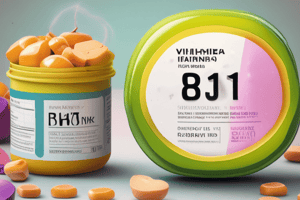Podcast
Questions and Answers
What class does Thiamine belong to?
What class does Thiamine belong to?
Vitamin B1
What is the description/actions of Thiamine?
What is the description/actions of Thiamine?
Combines with ATP in the liver, kidneys, and leukocytes to produce thiamine diphosphate which acts as a coenzyme in carbohydrate metabolism.
What is the onset/duration of Thiamine?
What is the onset/duration of Thiamine?
Unknown
Which of the following are indications for Thiamine? (Select all that apply)
Which of the following are indications for Thiamine? (Select all that apply)
What are the contraindications for Thiamine?
What are the contraindications for Thiamine?
Which of the following are side effects of Thiamine? (Select all that apply)
Which of the following are side effects of Thiamine? (Select all that apply)
What are the adverse reactions associated with Thiamine? (Select all that apply)
What are the adverse reactions associated with Thiamine? (Select all that apply)
What drug interactions are associated with Thiamine? (Select all that apply)
What drug interactions are associated with Thiamine? (Select all that apply)
In what forms is Thiamine supplied?
In what forms is Thiamine supplied?
What is the dosage and administration of Thiamine?
What is the dosage and administration of Thiamine?
What special considerations should be taken prior to the administration of Thiamine?
What special considerations should be taken prior to the administration of Thiamine?
Flashcards are hidden until you start studying
Study Notes
Thiamine Overview
- Thiamine, also known as vitamin B1, is essential for energy metabolism.
Mechanism of Action
- Thiamine combines with ATP in liver, kidneys, and leukocytes to form thiamine diphosphate.
- Acts as a vital coenzyme in carbohydrate metabolism.
Timing of Effect
- Onset and duration of action for thiamine is currently unknown.
Clinical Indications
- Commonly indicated for:
- Altered mental status (AMS)
- Delirium tremens
- Hypoglycemia
Contraindications
- Should not be used in patients with hypersensitivity to thiamine products.
Side Effects
- Possible side effects include:
- Hyposensitivity
- Anxiety
- Nausea and vomiting
- Angioedema
Adverse Reactions
- Serious warnings include:
- Restlessness
- Cyanosis
- Severe gastrointestinal bleeding
- General weakness and tenderness
- Potential for pulmonary edema
Drug Interactions
- May interact with:
- Alkaline solutions
- Sulfites
- Neuromuscular blockers
Presentation
- Available in forms such as:
- 1-ml ampules
- Vials
- Syringes
Dosage & Administration
- Recommended dosage is 100 mg administered as a slow IV injection over one to two minutes.
- Frequently given alongside D50 for best results.
Special Considerations
- It is important to obtain a thorough dietary history before administration.
- Epinephrine should be readily available in case of an allergic reaction.
Studying That Suits You
Use AI to generate personalized quizzes and flashcards to suit your learning preferences.




